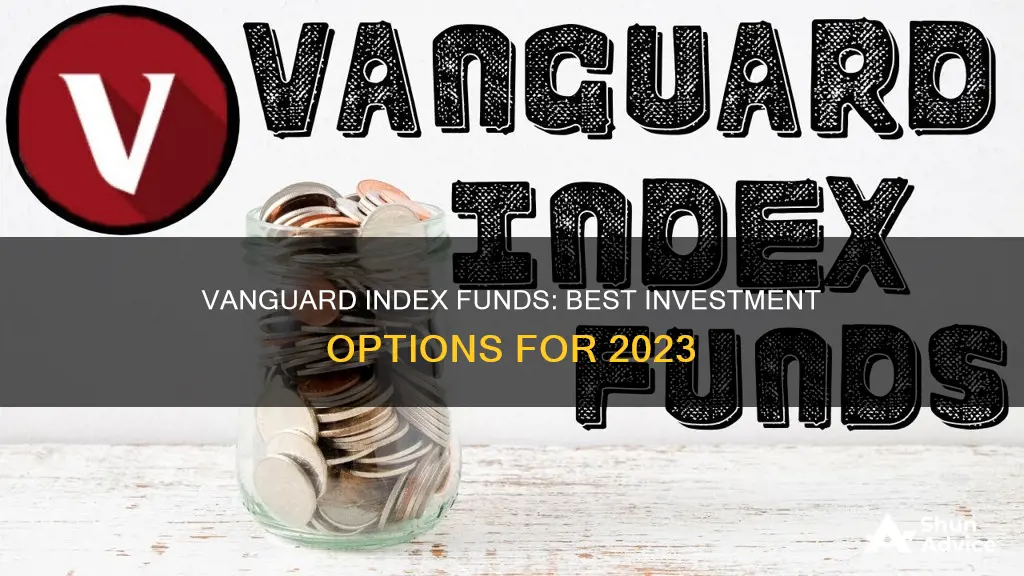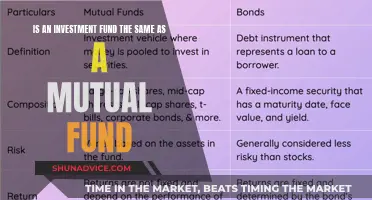
Vanguard is a popular choice for investors due to its low costs and high-quality offerings. The company offers a wide range of investment options, including index funds, which are a type of investment fund that tracks the performance of a specific market index. Vanguard's unique structure, where the funds own the company and investors own the funds, allows it to pass more savings directly to its investors.
Vanguard's index funds cover various markets and sectors, such as the S&P 500, Nasdaq, and international markets. They offer instant diversification, lower fees, and broad exposure to small, medium, and large companies across all sectors.
When choosing Vanguard index funds to invest in, it's important to consider factors such as the fund's performance, expense ratio, investment minimums, and your own investment goals and risk tolerance. Conducting thorough research and understanding the differences between active and passive investment strategies can help investors make informed decisions about which Vanguard index funds to choose.
What You'll Learn

Vanguard's low fees and high quality
Vanguard is a uniquely structured company that passes on savings to its investors. The company has no outside owners, and instead, its funds own the company, and investors own the funds. This means that Vanguard is not distracted by the demands of private owners or other outside interests, and can focus on lowering costs for investors.
Vanguard's average expense ratio across its index mutual funds and ETFs is 72% less than the industry average. The company launched the first index fund for individual investors in 1976 and has been perfecting its selection and tracking skills ever since.
Vanguard's low fees are complemented by the high quality of its funds. The company offers a wide array of investment choices, including roughly 200 mutual funds in the U.S. Vanguard's mutual fund offerings include passive index funds and actively managed funds. The company manages some of the best-known broadly diversified stock funds, bond funds, and balanced portfolios.
Vanguard's funds are also known for their strong performance. 83% of its index mutual funds and ETFs have performed better than their peer-group averages over the last 10 years. The company's long history of strong performance makes it a popular choice for investors.
Vanguard's passive index funds are particularly appealing for long-term investors. These funds have a low turnover rate, which means that they are not frequently buying and selling securities, resulting in lower costs for investors. Vanguard's funds also have low expense ratios, which means that investors pay a small percentage of their cash invested in the fund.
In addition to its low fees and high-quality funds, Vanguard offers investors the benefit of instant diversification. The company's index funds contain a preselected collection of hundreds or thousands of stocks or bonds, providing investors with exposure to a diverse range of companies and reducing the risk of losses.
Overall, Vanguard's low fees, high-quality funds, strong performance, and instant diversification make it a compelling choice for investors.
Best S&P Index Funds: Top Picks for Your Portfolio
You may want to see also

Vanguard's passive vs active investment strategies
Vanguard's passive investment strategy is a long-term approach that aims to mirror the performance of a specific market index, such as the S&P 500. This strategy is called passive because it does not involve actively selecting individual stocks or trying to time the market. Instead, Vanguard's index funds track a particular index by buying securities that represent companies across an entire stock index or specific groups within it. This approach offers instant diversification, reducing the risk associated with individual stocks. It also results in lower fees, as there is less buying and selling, and no need for costly analysts.
On the other hand, active investment strategies involve a more hands-on approach, where a portfolio manager actively selects stocks or other investments based on their performance or potential. Active investing requires deeper analysis and expertise to know when to enter or exit a particular investment. It provides more flexibility, as managers can buy stocks they believe are diamonds in the rough and can use various hedging techniques. However, active investing is typically more expensive due to higher transaction costs and analyst salaries.
Vanguard offers both passive and active investment options. While passive investing has gained popularity due to its lower fees and long-term performance, active investing remains prominent in the market. Active investing is particularly attractive during market upheavals, as it allows investors to react to short-term price fluctuations.
When choosing between Vanguard's passive and active strategies, investors should consider their risk tolerance, investment goals, and costs. Passive investing is generally more cost-effective and has historically earned higher returns, but active investing offers more flexibility and the potential for significant returns if managed successfully.
Bond Funds: Where to Invest Now?
You may want to see also

Vanguard's investment tracker funds
Vanguard is a uniquely structured company that passes on savings to its investors. It is owned by its funds, and investors own its funds. This means that Vanguard is not distracted by the demands of private owners or other outside interests, and can focus on lowering costs for its investors.
Vanguard offers a range of tracker funds, including:
- FTSE 100 tracker – Vanguard's FTSE 100 tracker fund aims to replicate the performance of the FTSE 100 index, which tracks the performance of the 100 largest companies listed on the London Stock Exchange.
- FTSE All-World High Dividend Yield UCITS ETF – This fund tracks the FTSE All-World High Dividend Yield Index, which measures the performance of companies with high dividend yields in developed and emerging markets.
- FTSE All-World UCITS ETF – This fund tracks the FTSE All-World Index, a market-capitalisation-weighted index of large and mid-cap stocks in developed and emerging markets.
- FTSE Developed World UCITS ETF – This fund tracks the FTSE Developed Index, which measures the performance of large and mid-cap stocks in developed markets.
- FTSE Emerging Markets UCITS ETF – This fund tracks the FTSE Emerging Index, which measures the performance of large and mid-cap stocks in emerging markets.
- FTSE Japan UCITS ETF – This fund tracks the FTSE Japan Index, which measures the performance of large and mid-cap stocks in Japan.
- S&P 500 Index Fund Admiral Shares – This fund tracks the S&P 500 Index, which measures the stock performance of 500 large companies listed on stock exchanges in the US.
- Total Stock Market Index Fund Admiral Shares – This fund covers the entire US equity market, including small-, mid- and large-cap growth and value stocks.
- Total International Stock Index Fund Admiral Shares – This fund tracks stock indexes in both developed and emerging markets across the globe.
- Total World Stock Index Fund Admiral Shares – This fund provides investors with a globally diversified investment portfolio, tracking the FTSE Global All Cap Index of over 9,900 stocks from US, international developed and emerging markets.
Index Funds vs Roth IRA: Where Should You Invest?
You may want to see also

Vanguard's performance and fund options
Vanguard is a uniquely structured company with no outside owners. Instead, its funds own the company, and investors own the funds. This means Vanguard is not distracted by the demands of private owners or other outside interests, and can pass on savings to investors.
Vanguard's average expense ratio across its index mutual funds and ETFs is 72% less than the industry average. 83% of its index mutual funds and ETFs have performed better than their peer-group averages over the last 10 years.
Vanguard offers a wide range of funds to choose from, including:
- Vanguard 500 Index Fund Admiral Shares (VFIAX): Also known as the Vanguard S&P 500 Index fund, this fund gives investors exposure to 500 of the largest U.S. companies, which make up 75% of the U.S. stock market's total value.
- Vanguard Total Stock Market Index Fund Admiral Shares (VTSAX): This fund covers the entire U.S. equity market, including small-, mid-, and large-cap growth and value stocks.
- Vanguard Growth Index Fund Admiral Shares (VIGAX): This fund takes a buy-and-hold approach to stocks in large U.S. companies in sectors with higher growth potential, such as technology, consumer services, and financial services.
- Vanguard Small-Cap Index Fund Admiral Shares (VSMAX): This fund targets smaller publicly held companies, for investors who want to diversify away from larger public companies.
- Vanguard Total Bond Market Index Fund Admiral Shares (VBTLX): This fund gives wide exposure to U.S. investment-grade bonds, investing about 30% in corporate bonds and 70% in U.S. government bonds.
- Vanguard Balanced Index Fund Admiral Shares (VBIAX): This fund mixes its investments between stocks (roughly 60%) and bonds (about 40%) to balance growth and stability.
- Vanguard Total International Stock Index Fund Admiral Shares (VTIAX): This fund tracks stock indexes in both developed and emerging markets across the globe.
Vanguard also offers a range of target retirement funds, which adjust their risk profile over time, gradually becoming more conservative as the target retirement date approaches.
In addition to its index funds, Vanguard offers a range of actively managed funds, as well as a number of SustainableLife funds that consider the environmental, social, and governance (ESG) characteristics of the businesses they invest in.
Vanguard's LifeStrategy funds offer five different blends of equities and bonds, allowing investors to target a level of risk and return that suits their needs. These funds are ready-made portfolios of Vanguard tracker funds, with a heavy focus on U.S. equity trackers.
Vanguard's funds are available to investors through either an investment broker or fund platform, or through Vanguard's own investment platform, Vanguard Investor.
Vanguard Funds: Minimum Investment Requirements and Options
You may want to see also

Vanguard's platform fee and fund charges
Vanguard is a uniquely structured company that passes on savings to its investors. It doesn't have any outside owners, and instead, its funds own the company, and investors own the funds. This means that Vanguard is not distracted by the demands of private owners or other outside interests, and can focus on lowering costs for its investors.
Vanguard's average expense ratio across its index mutual funds and ETFs is 72% less than the industry average. The average expense ratio for Vanguard is 0.05% compared to the industry average of 0.18%.
Vanguard offers two types of shares to individual investors, with different minimum investments and expense ratios:
- Investor Shares: Minimum investment of $1,000 to $3,000, and an expense ratio range of 0.08% to 1.8%.
- Admiral Shares: Minimum investment of $3,000, and an expense ratio range of 0.04% to 0.62%.
Vanguard also offers exchange-traded funds (ETFs) which carry no minimum investment and can be bought and sold throughout the day like stocks. ETFs are also frequently more tax-efficient than index funds.
Vanguard's platform fee for its own investment platform, Vanguard Investor, is an annual account fee of 0.15% on investments up to £250,000, which is less than half of the industry average. There is no annual account fee for investments over £250,000, with a maximum platform fee (annual account fee) of £375.
Vanguard's ongoing fund charges range from 0.06% to 0.78%, which is also far lower than the industry average. There are also occasional fund entry charges of between 0.20% to 0.80%.
For those who opt for a Vanguard Managed Stocks and Shares ISA or Managed SIPP, there is an additional management fee of 0.30% on top of the account fee and average fund charges.
Vanguard regularly reviews the interest rate it pays on cash balances and currently pays 2.45%. Interest accrues daily and is paid on the first working day of the month.
Vanguard's low fees make it a popular choice for investors, and it has a long history of strong performance.
Index Funds: Understanding Their Typical Investment Strategies
You may want to see also
Frequently asked questions
Vanguard index funds track the performance of a single market index, such as the S&P 500 or Nasdaq, to mirror its total market returns.
Vanguard creates index funds by buying securities that represent companies across an entire stock index or that are targeted to specific groups (e.g. an industry sector, similarly-sized companies, or firms in the same part of the world). Individual investors purchase shares of the fund that interests them, claiming a slice of its returns.
The best Vanguard index fund for you depends on your portfolio mix, risk tolerance, and what you can afford based on account minimums and fees. Some popular Vanguard index funds include:
- Vanguard 500 Index Fund Admiral Shares (VFIAX)
- Vanguard Total Stock Market Index Fund Admiral Shares (VTSAX)
- Vanguard Growth Index Fund Admiral Shares
- Vanguard Small-Cap Index Fund Admiral Shares
- Vanguard Total Bond Market Index Fund Admiral Shares
Investors make an initial minimum investment, typically around $3,000, and pay annual costs, known as an expense ratio, based on a small percentage of the cash invested in the fund.
All investments carry risk, but Vanguard has a long history of strong performance. Vanguard index funds are passively investing in index funds, which is popular because most actively managed funds fail to consistently outperform the market.







